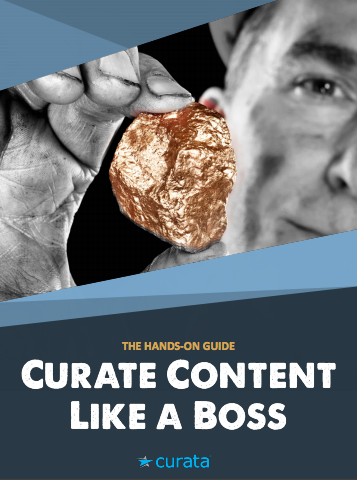- Share Creating an Influencer Marketing Program for Content Promotion on Facebook
- Share Creating an Influencer Marketing Program for Content Promotion on Twitter
- Share Creating an Influencer Marketing Program for Content Promotion on Linkedin
- Share Creating an Influencer Marketing Program for Content Promotion via email
Let’s say a marketer crafts the most jaw-droppingly awesome message in the world. It could be more persuasive than the sermon on the mount for Jesus’s disciples, uttered by movie stars, and served on a bed of rich Belgian chocolate. But if no one ever sees or hears it, it will be as useful as a reggae band at a klan party. Quality content needs effective promotion. And influencer marketing is a crucial amplifier of other content marketing promotion methods.
Effective promotion requires the same degree of resources and thoughtfulness as creating quality content does. There are an abundance of content promotion tools available to help. Peruse the best of them in Curata’s Ultimate List of Content Promotion Tools. There’s a range of platforms from social media networks, to social media management tools, paid content promotion tools, distribution tools, and advocacy tools.
Good Tools Aren’t Enough
Such tools are an extremely useful part of any content marketing strategy. But while necessary, they are not sufficient for effective promotion. They lack one crucial element: the human element. A 2015 Nielsen Trust in Advertising report asked consumers which forms of advertising they trusted the most. The overwhelming winner for more than 8-in-10 global respondents was recommendations from people they know and trust. Online banner ads and search engine result page ads were trusted by less than half the respondents.
 DAVID MEERMAN SCOTT
DAVID MEERMAN SCOTTBestselling author of The New Rules of Marketing & PR and Newsjacking, Marketer in Residence at Hubspot, keynote speaker. @dmscott
What’s my best advice for marketers creating an influencer marketing program for content promotion? Educate and inform instead of interrupt and sell.
What Not to Do
There are a lot of easy pitfalls to avoid when you’re developing an influencer program for content promotion. Most involve not thinking about an influencer as an actual person, but just as a means to an end.
For instance, don’t ever send a form letter email or mass mailing. (Think about how well they work on you.) Personalize your email beyond just their name and company. Show what you know about them, such as mentioning a hobby you’ve seen them talk about on Twitter.
Never just ask for something upfront from a cold open. Saying “Please share this with your followers” the first time you introduce yourself just establishes you as a clueless jerk.
Research shows 75 percent of brands find it difficult to identify the right influencers in their niche to partner with. Don’t invest time and money on influencer marketing before you’ve vetted your list to find people who are actually relevant. They need to drive real changes in attitude, perception, and adoption patterns.
A Brief History of Influencer Marketing
 Data confirms what should be obvious: we listen to messages coming from specific people we know and trust more than those coming from impersonal organizations.
Data confirms what should be obvious: we listen to messages coming from specific people we know and trust more than those coming from impersonal organizations.
The first researcher to discover this, Paul Felix Lazarfeld (later with Elihu Katz), published a book analyzing which factors affected voters’ decision making process during Franklin Roosevelt’s quest for a historic third term in the 1940 presidential campaign. The People’s Choice (1944) introduced the idea of influencer marketing to the public sphere.
Katz and Lazarfeld’s later book Personal Influence (1955) is considered the handbook of the theory of two-step communication. It argues most people form their opinions under the influence of opinion leaders rather than large brands or political figures. Ideas then, flow from media to opinion leaders, and from them to a wider population.
Influencer marketing has existed for a half century. But it’s only since social media became ubiquitous that influencers could substantially scale their reach.
Why Use Influencers?
We already trust people ahead of organizations. And today’s world of information overload means we place even more stock in people with authenticity and credibility. We don’t trust an authentic jackass! Well executed influencer marketing is important not only for content promotion, but also for relationship development and effective SEO link building.
 ANN HANDLEY
ANN HANDLEYAnn Handley, head of content at MarketingProfs, world’s first Chief Content Officer, author of the WSJ bestseller Everybody Writes @MarketingProfs
Don’t launch an influencer program because you want influencers to promote your content. That’s the wrong mindset—because it’s both short-sighted and one-sided.Instead, there are far better reasons to launch an influencer program:
- Launch an influencer program to cultivate relationships with people who align with your bigger story, values, and purpose.
- You want to give them access and insight.
- It would be great to work with them long-term.
A by-product might be that they’ll promote your content—because they want to and are motivated by your success (and vice-versa). But that’s a by-product of a successful relationship. Not the reason to launch a program.
SEO Benefits
Part of effective SEO requires marketers to generate back links to our sites in order to rank higher in search engine results pages. Google prioritizes links from larger, higher quality sites such as say—the New York Times, over links from some student’s content farm blog in Russia. Back links are ranked as a vote of confidence about the quality and reliability of a website.
As you develop a relationship and trust with an influencer, both parties link to each other’s content. For example, linking to each other’s social media posts on accounts such as LinkedIn, Twitter, and Facebook, and sharing guest posts on each other’s blogs that link back to each other’s websites. You both help to extend each other’s audience and reach.
Branding Benefits
The SEO benefits of link building from an influencer relationship are arguably secondary to how they position your brand on the web. Links imply relationships between entities. Associating your brand with other known entities is an indispensable signal—for both humans and search engines—in determining which brands are credible and trustworthy. It’s a long term strategy that requires resources and patience. The benefits however, like compound interest, accrue over time.
Influencer marketing also provides short-term results though. It can drive immediate traffic and sales. Publishing content on an influencer’s site gives you access to an already large and established audience. Influencer marketing should be thought of as an accelerator to your content marketing strategy. It amplifies (rather than replaces) your other content promotion options.
Building an Influencer Network
There are a plethora of social media ranking and monitoring tools available such as BuzzSumo, Klout, sproutsocial, TrackMaven, Traackr, and Lumanu (for micro-influencers). They will help you search for relevant influencers by subject, degree of influence, location, and other parameters.
 GINI DIETRICH
GINI DIETRICHCEO of Arment Dietrich, keynote speaker, author of Spin Sucks @ginidietrich
The very best thing marketers can do when creating an influencer relations program for content promotion is very carefully, hand-select the people with whom you want to work. There is nothing worse than being on the receiving end of a pitch, when it’s not a fit for you at all. Plus, it leaves a bit of a sour taste in the people you may want to work with in the future. Most likely, you’re going to work with only a handful of people so do your homework. Cultivate the relationships. And then make the ask. This almost guarantees 100 percent success.
Once you narrow your list down to the most likely candidates, it pays to personally evaluate the substance of a potential influencer’s work. You can learn a lot from their comments, reviews, and posts on social channels. Kristen Matthews of GroupHigh advises evaluating influencers against content fit, reach, and engagement. This helps you filter out the least relevant fits for your brand, and forces you to read their content and determine if outreach truly makes sense.
Influencers are People Too
When you’ve done your homework and you’re ready to reach out, remember that an influencer doesn’t owe you anything. Especially not a response to some random stranger rude enough to ask for something without offering anything in return. Show that you share interests, goals, and priorities. Compliment them on an article, video, or SlideShare they created that you liked. If you’d like someone to contribute content to your blog for example, tell them about your readership and how you’ll be promoting it. That way they can assess whether your audience is large enough and targeted enough to their area of expertise to be worth their time engaging.
 ARDATH ALBEE
ARDATH ALBEEAuthor of Digital Relevance, CEO of Marketing Interactions, keynote speaker @ardath421
Creating an influencer program takes a commitment to provide value to the influencer. The most important thing is to see the situation from their side. What’s in it for them? Why should they care? And will what you’re asking for complement what they are passionate about? Once you’ve matched those things up with the influencers on your list, do something for them. Comment on their blogs, share their social posts, ask intelligent questions that show you know what they care about. Do this before you ask for anything in return. Influencer marketing is about building mutually-beneficial relationships. And it’s something that marketers need to get better at if they hope to put influencer marketing to work successfully. Essentially, you get what you give.
Keep it short and sweet, and at the end of your email outreach, clearly state a proposed next step. It’s important to then stay in contact. Retweet them, like their status updates, email to let them know about upcoming projects you have that they may be interested in collaborating on. All relationships require maintenance, and influencer relationships are no different.
Define Objectives
There are typically multiple objectives in any content marketing plan, whether it’s to increase brand awareness, website or blog visitors, social sharing, or leads generated. There are also multiple stakeholders to consider. Your brand may want to grow expertise on a given topic, influencers may want exposure, and prospects almost certainly want expert information. Write these down so you can measure how well you achieve them.
Keywords and Headlines
Clarify which subjects to focus on by defining the headlines you want to write in terms of the search terms and customer questions you want to address. Use keyword research to determine what your prospects are interested in and how to address their concerns.
TopRank Ceo Lee Odden suggests that, “Topics represent the themes and areas of focus for planning editorial and for sourcing influencers. Topic alignment between brand, influencer and community is essential for mutual value to be created.”
The type of content you choose will usually be dictated by your content marketing plan, but remember, some content formats are more conducive to influencer co-creation than others. These include webinars, eBooks, whitepapers, long form blog posts, and SlideShares.
 MICHAEL BRENNER
MICHAEL BRENNERCEO of Marketing Insider Group, keynote speaker, co-author of bestselling book The Content Formula @BrennerMichael
Marketers need to start from the perspective of the influencers and answer what’s in it for them, before asking for favors and content. Book them to speak at your events, pay them to write a series of articles, invite them to participate in other events for free such as webinars and Twitter chats. Most influencers want to build a relationship with the brands they support and are happy to offer their time and insights once there is some mutual trust.
The Planning Process
Make the process of working with you as easy as possible. For example, rather than always asking them to write something for you from scratch, offer to write the first draft of a blog yourself. Or rewrite an older (high performing) post of theirs, allowing them to edit it as they see fit. If the quality of work is equal, busy people will always choose to collaborate with those who make life more convenient.
You will send and receive many emails before you and your influencer have managed to hammer out a subject and format that aligns with both parties’ needs. Once you have completed content you’re both happy with, make it easy for them to promote it. Provide assets such as pre-written tweets, embed codes, shortened URLs (with tracking code for the particular campaign). Make it easier to share your content—and it will be shared more.
Measure Results
Sharing is only one metric to measure the success of your influencer marketing promotion plan however. Curata focuses on metrics such as leads and revenue generated, and the quality of backlinks, time on site, scrolling time, and bounce rate which are all crucial to SEO rankings. Other metrics such as social shares and page impressions tend to be vanity metrics. They look good, but don’t always count for much (towards your business goals at least).
Follow Up
When you’ve published your piece and distributed it through all your, and your influencer’s promotion channels, email them and thank them. Follow up and let them know if their content did well, or if there’s any comments for them to respond to.
 CARLA JOHNSON
CARLA JOHNSONKeynote speaker, author of Experiences: The 7th Era of Marketing, Chief Experience Officer at Type A Communications @CarlaJohnson
The best advice I have for marketers creating an influencer marketing program for content promotion is relevance:To influencers – Spend time researching their content and what matters to them. Are many of their followers part of your market? Make sure their audience is actually one interested in what you deliver. Also, how can you ensure your outreach is beneficial to influencers themselves? They get many asks, make sure that the relationship you want to build is one they believe is relevant and worth their time.
To your audience – Do your homework to find the most appropriate influencers. Just because someone is influential doesn’t mean they’re the right influencer for your brand. Think about what channels your buyers use and match those with your influencer outreach. No sense investing in YouTube influencers if your buyers hang out on LinkedIn.
To your brand – Invest wisely and do your homework. Which influencers can help you meet the business objectives of your brand? Every company’s goals are different and there’s aren’t any one-size-fits-all standards for influencer programs. What worked beautifully for another brand may not be something that brings success for you.
Influencer Marketing: Integral to Content Promotion
Content is not king. Not unless people can find it, and not unless it’s presented well enough to hold people’s attention ahead of the avalanche of other competing content out there.
One of the best ways to introduce new people to your content is to get someone with a built-in audience to tell them about it. Influencers have an authenticity and credibility that other entities can’t match. We take messages from them more seriously than from other sources. Google does too, which means building a relationship with an influencer also helps improve your domain and search engine results page rankings.
Finding the right influencers isn’t hard with the social media ranking and monitoring tools available. Engage with them respectfully and genuinely. Measure the results. Do it right, and you won’t just have developed an effective way to amplify your content promotion, you may just find you’ve developed a new friend. For a thorough examination of how to measure the results of your influencer marketing content promotion, download The Comprehensive Guide to Content Marketing Analytics & Metrics eBook.










